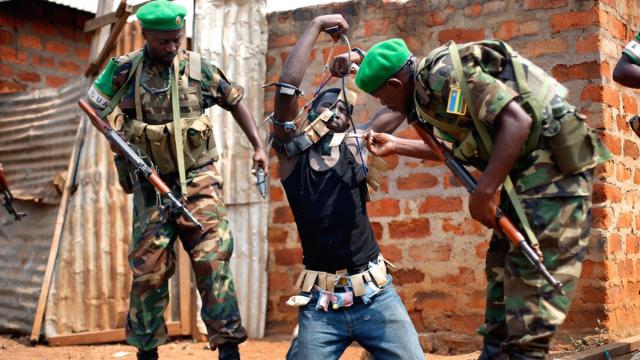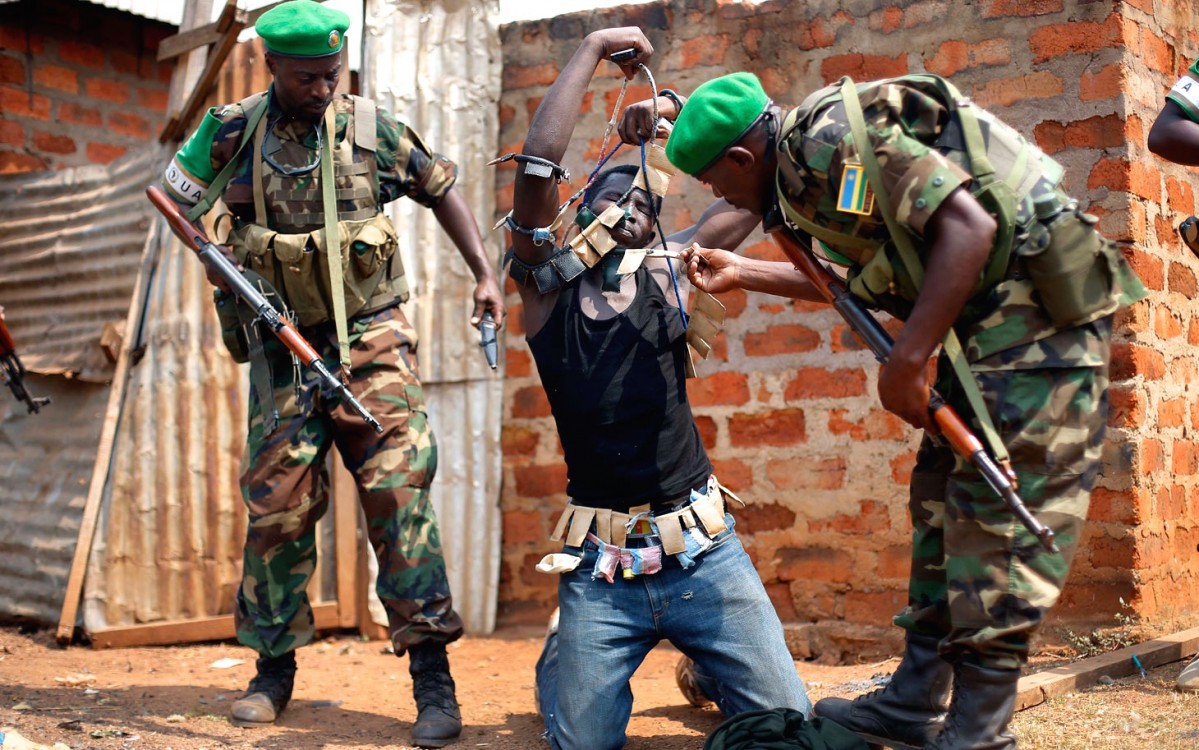
The Central African Republic is now awash in media coverage over the ongoing sectarian violence and general upheaval in the country. But while many outlets discuss the volatile situation in the CAR, few analyses have put the violence in a historical context to discuss the way that countries like France, Chad and the United States bear implication as well. The violence in the CAR is unprecedented and worrisome. Historically, however, it is but another unfortunate and bloody chapter in the country's unstable history. This is the first in a two-part series on that conflict.
A History of Violence
The CAR is a former French colony that gained independence soon after a 1958 French constitutional referendum dissolving France’s African holdings. The first president, Barthélemy Boganda, died in a March 1959 plane crash and power was transferred to David Dacko who oversaw the CAR’s declaration of independence on August 13, 1960, and soon established a one-party state.
Dacko’s days, too, were numbered. In 1965, Jean Bedel Bokassa, a colonel in the CAR military, “was plucked by France to overthrow the Central African Republic's first President, his cousin David Dacko, when Mr. Dacko began establishing close ties with China.” Bokassa was chosen due to his fierce devotion to France and his anti-Communist stance.
After overthrowing Dacko in a bloodless coup, Bokassa quickly broke off relations with China and took on a multitude of titles, which would culminate in his declaring himself king of the republic in 1977. In addition to changing the CAR’s foreign policy, Bokassa also suspended the constitution and dissolved the National Assembly, allowing him free reign to do as he pleased.
Though he showed increasingly strange behavior as time passed, the French government still maintained good relations with Bokassa, going so far as to congratulate him when he declared the CAR an empire and took the title of emperor. However, France eventually turned its back on him due to his increased show of deciding foreign policy on his own. The French then helped put Dacko back into power via a coup against Bokassa in 1979.
In 1981, elections took place and Dacko emerged victorious over challenger Ange-Félix Patassé, but charges of fraud remained. Just months later, Army Chief of Staff Gen. André Kolingba seized power in a military coup. While there was a subsequent coup attemptagainst Kolingba involving Patassé, the coup failed and Patassé fled to the Togo, eventually returning to the CAR in the early 1990s.
Meanwhile, Kolingba operated what was essentially a military dictatorship lasting well into the next decade, due to a new constitution approved in 1986 that “provided him a single-party state and six-year term as president.” This aided him in the 1988 elections since opposing political parties were not allowed to participate. After the fall of the Berlin Wall, in 1990 a pro-democracy movement sprouted and blossomed in the CAR. Kolingba responded by detaining many protesters, but later agreed to hold free elections after having come under pressure from “countries like the United States and France, but also agencies and organizations like the UN.”
In 1993, Ange-Félix Patassé was elected president of the CAR. The instability of the country continued with three different army mutinies in April, May and November of 1996. The first munity occurred when some 400 soldiers demanded paychecks, with soldiers “[entering] the homes of business executives, demanding money and vehicles and beating those who refused.” Governments that have ruled over the CAR have generally been extremely corrupt, with the IMF and World Bank noting in 2013 that on a regional level, corruption hindered the growth of many Central African states. (According to Transparency International, the CAR today stands near the bottom of a list of least corrupt states, ranking 150 out of 175 nations in corruption.
In May of 1996, the army mutinied again as its leaders accused Patassé “of transferring the army's armory to his presidential guard.” To put down the mutiny, Patassé requested aid from France, which eventually sent in 1,000 soldiers and 100 special forces commandos. The mutiny eventually died down with a ceasefire being negotiated.
After the April and May mutinies, Patassé “formed a new government that included Kolingba supporters, but the country's main opposition groups refused to join the coalition.” However, a third mutiny in November occurred as soldiers took advantage of Patassé's being out of the country. Once again, the French came to his aid and “rapidly deployed patrols throughout the city to protect key points and provide support to the Presidential Guard. Additional French Foreign Legion troops were flown into CAR from Chad to supplement the 1,750 soldiers already stationed in the country.” That mutiny too was eventually put down, but not before threatening to devolve into ethnic conflict.
These mutinies were stirred up by Kolingba, who “is from the Yakoma group, which is part of the Ngbandi ethnic group found on the banks of the Obangui river in the south.” When Patassé first came to power, the military was mainly made up of soldiers from Kolingba’s ethnic group. In response, Patassé “created militias favoring his own Gbaya tribe and did not bother to pay the Yakoma-dominated regular army,” which actively contributed to the mutinies. A final rebellion occurred in 1997, but was put down by a pan-African force.
The troubles didn’t end there for Patassé, as Kolingba in May of 2001 sponsored an unsuccessful military coup setting off a series of events that ultimately led to Patassé’s removal. After the coup attempt, the president accused his Army Chief of Staff, François Bozizé, of involvement and fired him. Bozizé rallied troops to resist his sacking, but was ultimately forced to leave for exile in southern Chad. These events deeply split and weakened the CAR armed forces—the Central African Armed Forces—dividing it between Patassé and Bozizé loyalists.
Overall, Patassé’s time as president was problematic for the country, not only due to the mutinies and attempted coup, but also the fact that “the CAR underwent economic collapse, losing what was left of its institutional capacity to provide social services for its citizens, and increased its dependence on external aid for survival," and Patassé “built up the Presidential Guard at the expense of the army, further ethnicizing the state security forces.”
In October 2002, Bozizé launched the next coup. Patassé, however, was able to beat him back with the aid this time of Libyan forces. Muammar Gaddafi had backed the CAR government since 2001, “in return for a 99-year monopoly on extracting the republic's vast reserves of diamonds, gold and other minerals.” However, in 2003, when Patassé was out of the country in Niger, Bozizé swept into the capital with 1,000 troops and took control.
The next year, voters in the CAR accepted a new constitution, which “provides for a five-year presidential term, renewable only once, and the appointment of the prime minister from the political party with a parliamentary majority.” Quickly following this change was the 2005 presidential elections in which Bozizé ran as an independent and won.
From this election came the rise of the Peoples Army for the Restoration of the Republic and of Democracy (APRD), led by Jean-Jacques Demafouth, and made up of mainly former Presidential Guard members. Another group that emerged from the elections was the Union of Democratic Forces for Unity (UFDR), which “is made up largely of the mainly-Muslim Gula ethnic group” and “include men who helped Bozizé overthrow Patassé in 2003 but who subsequently felt disgruntled with the lack of recompense.” Both of these groups are from the northern region of the CAR and have actively fought against the Bozizé government.
That rebellion occurred due to economic and political weakness within the CAR government. At the time, Bozizé had little poweroutside of Bangui, the capital, “while extreme poverty and a lack of both strong government institutions and economic development have contributed to declining support for the government among CAR citizens.” Citizens from the north, generally anti-Bozizé, accused him of “favoring southerners since taking power, of failing to uphold democratic commitments, and of delaying implementation of promised political and economic reforms.”
The rebel groups actively fought the CAR government, and in 2006 it was reported that an escalation in fighting between the APRD and government troops caused 70,000 people to flee the country. To bring an end to the fighting, a comprehensive peace agreementwas brokered in 2008, quickly following what was called an Inclusive Political Dialogue. The Dialogue “called for the creation of a government of national unity; the holding of municipal elections in 2009, and legislative and presidential elections in 2010, which actually took place in January and March 2011; the creation of a national human rights commission; the launch of a program for the disarmament, demobilization and reintegration (DDR) of former combatants.” However, the goals of the Dialogue never came to fruition, as the report states:
"[N]early five years later, the overwhelming feeling is bitter disappointment: the inclusive government was never put in place; the 2011 elections took place but, according to observers, were marred by many accusations of fraud; the state disintegrated further; the “grey zones” outside state control expanded; most of the agreed essential reforms were never implemented; and the attitude adopted by both the government and rebel groups meant the demobilisation, disarmament and reintegration (DDR) program never saw the light of day for combatants in the north east."
Coupled with the fact that democratic rule had effectively ended due to Bozizé’s authoritarian ways, and “conditions inside the CAR rapidly declined as economic under-development, nepotism and corruption fostered dissent and emboldened political opponents,” Bozizé was finally ousted in 2013 by the rebel group Séléka, which installed its leader, Michel Djotodia, as interim president.
The second installment of this piece, which runs tomorrow, will explore Séléka in the context of the ongoing sectarian violence between Muslims and Christians in the Central African Republic.
3 WAYS TO SHOW YOUR SUPPORT
- Log in to post comments















